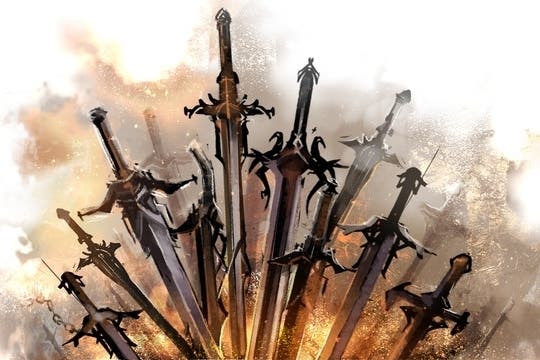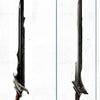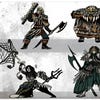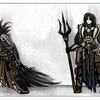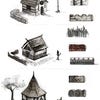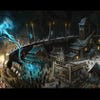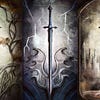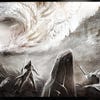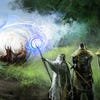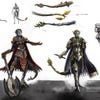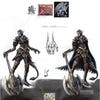Can Camelot Unchained kickstart MMOs?
With Dark Age of Camelot Mark Jacobs sent the genre on a brave new direction - and he's about to do it all over again.
I'm more excited about Camelot Unchained than any other MMO in development. Freeze the image that popped into your head when you read "MMO" - what did you think of? Did you picture an astronomically expensive game taking ages to make and desperately ticking boxes to satisfy an audience as large as World of Warcraft's? Throw that image away, because Camelot Unchained is quite the opposite.
Camelot Unchained is ruthlessly designed for a niche, an MMO audience that enjoys a three-realm war (RVR) between players and only players - there is no PVE progression, no fighting monsters for experience or for equipment. Everything in the game is designed with this everlasting war in mind. It's experimental, and made by a small team that wants people playing it and testing ideas as soon as possible - by January, if all goes to plan. Best of all, Camelot Unchained makes no bones about not being for everyone, because by only costing $5 million - rather than 10-times or 50-times that - it doesn't need even hundreds of thousands of subscribers to make it a success.
There's no publisher involved, which explains a thing or two, because Camelot Unchained is a Kickstarter hopeful, one of the first of its kind. Nearly two-thirds of the lofty $2 million goal has been raised with a week to go, so it's on course but it will be tight. If it reaches that $2 million goal then a further $3 million in private funding will be thrown in, the idea vindicated and investors convinced. $2 million will come from the pocket of Mark Jacobs, the founder and leader of Camelot Unchained developer City State Entertainment, and the other reason this MMO has a chance. He founded Mythic Entertainment and made Dark Age of Camelot, the MMO that coined the term RVR, and the one that is the inspiration for Camelot Unchained. Jacobs' RVR ideals shone brightly again in Warhammer Online.
I spent two hours talking to Mark Jacobs recently because I needed convincing. I needed to know why I should put my faith in him again to create the MMO I've wanted since Dark Age of Camelot, and the days of running anxiously through contested territory, bumping into unnamed and mysterious elves and trolls - other players - and trying to take from them what was theirs. To understand why you should trust him is to understand him and his story, so here it is.
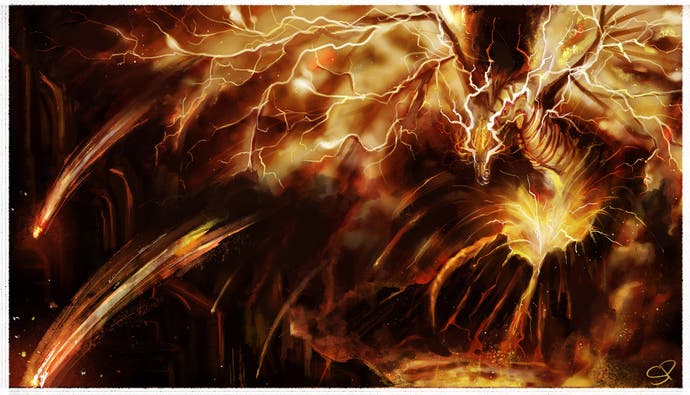
Dark Age of Camelot only cost $2.5 million
MMOs didn't always have budgets the size of oceans. Mark Jacobs made Dark Age of Camelot for $2.5 million ($2,420,000 to be more precise), a sum he raised by selling a third of his company, taking out a loan and putting office expenses on his credit card. Distributor Vivendi chipped in a "tiny amount" but "frankly everyone else had turned us down." That's because it was 1999 and MMOs were unproven and really only Ultima Online and EverQuest were making any money. It was a landscape every bit as challenging as 2013.
Jacobs' mettle was tested again and again making Dark Age of Camelot. Months before launch, computer giant Dell got nervous and wouldn't lease Jacobs the servers he needed to host his MMO, and he found himself in a real pickle. He wasn't asking for much, but the dotcom collapse had made Dell nervous and he was turned away. Even when Jacobs called on family ties to a super-rich relative, who knew the PC giant's founder Michael Dell personally, they still wouldn't do it.
"I said OK, now let me get this straight. I want the equivalent of maybe $50,000 of servers and the guy who's going to sign his name, as well as my name, could probably buy your company right now if he wanted to - look at this last name! Do you realise who that is? And they said no that's not good enough.
"Oh. My. God! You couldn't hope for a better name! And this is not fake money, this is the guy whose family have done very well over the decade, and the amount of money to them is trivial! And they wouldn't do it.
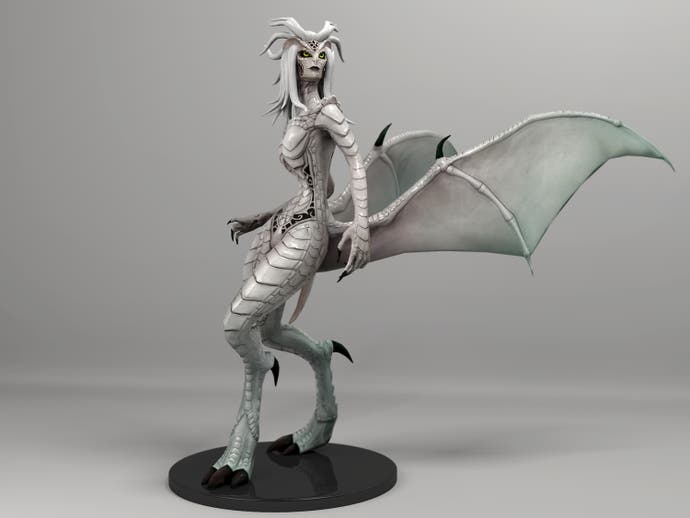
"I almost had a coronary right there."
He got the servers, eventually, by buying them, and Mythic would go on to be a great customer of Dell's for years to come. "But let me tell you, Robert, those couple of months where I'm thinking we've got this great game but we're going to have nothing to run it on because no one will trust us ... oh my god!"
There was so little faith in Dark Age of Camelot that distributor Vivendi said it would be "thrilled" with 40,000 sales and, presumably, subscribers. Jacobs fondly remembers proving Vivendi wrong that first weekend when not a copy remained in any shop anywhere and Vivendi rang in excited hysteria pleading for more CD-keys, not that Jacobs had the server infrastructure to support them - so he rushed down to the local Micro Computer Store and bought a load of "plain old desktops" to be impromptu servers instead. "I kid you not!"
This MMO built by a team of 12-rising-to-25, on a shoestring budget of $2.5 million and with an RVR premise Jacobs thought would "scare off too many people", would go on to peak at 250,000 monthly subscribers. It was a great success. Camelot Unchained will have a team of the same size, incidentally, but a budget twice as big.
WOW changed everything
What happened next was World of Warcraft smashed into the MMO world like a meteor. People left Dark Age of Camelot to play WOW so Mythic changed DAOC to win them back. The RVR core was obscured by trendy PVE content and Dark Age of Camelot slipped into irrelevance while the world obsessed with WOW. Such was the shadow that WOW cast that a Dark Age of Camelot sequel, which was "absolutely" talked about, was scrapped before it began.
"WOW raised the bar so much in terms of quality and production values that if we would have gone into development with a smaller scale Dark Age 2 say in 2003 - when we saw WOW we would have gone, 'Now what? We're gonna have to up the scale'.
"If we had done that and gone into development with Dark Age 2, Mythic would have found itself in dire straits with a game whose budget would have gone like that [gestures to infinity and beyond] in chasing that market." Mythic couldn't afford it, he says, and such a project would have been "ruinous".
That was when Mark Jacobs learnt another lesson about RVR MMOs that he still feels rings true today, "that there is a much smaller market for [them]".
"I love RVR games. I've been making PVP games from the moment I made my first online game. But it is my opinion - and it is an opinion brought out by the industry and its history of MMOs - that the majority of RPG players, not FPS players, do not want a PVP or RVR game."
Those who do are "dedicated" and "loyal" and "desperate for a great game", he says, "but they're not millions of people". "Even if we had done a great job with Camelot 2, the amount of new people we would have brought to our game wouldn't have justified the expense that it would have taken."
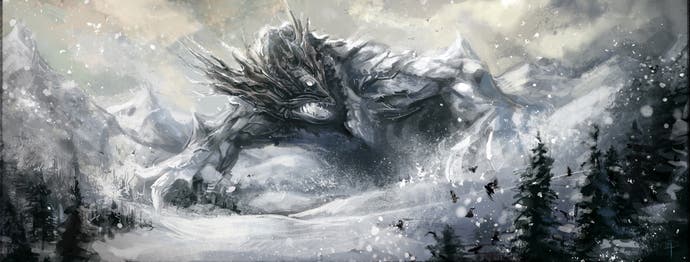
Why Warhammer Online, then?
Mark Jacobs thought Warhammer Online had a shot where DAOC2 didn't because of the Warhammer brand. "My belief was because Warhammer had such a strong brand name that even if we couldn't have quite the production values of what was rumoured to be between $60-$100 all-in on WOW1 [no expansions], that we would be able to pull it off."
Jacobs and Mythic signed Warhammer Online in 2005, a year before EA was on the scene, and his theory about the brand held true as the project attracted "a tonne of money" from European partner GOA and "very significant" offers from Asia. Then came EA in 2006 and Jacobs signed away control of his studio's destiny to embark on a project that posed WOW its greatest threat yet.
Warhammer Online's budget "wasn't even close" to the $60-$100 million Mark Jacobs had heard World of Warcraft cost, and he was under no illusion of capturing the kind of audience World of Warcraft already had at that point - over 5 million subscribers. EA NDAs prevent him being too specific, but prior to being bought by EA he predicted 300,000 subs for Warhammer Online.
"It would be really easy for me to sit and bash EA, believe me, very easy."
"Did I think with EA we could do better than my initial projections? Absolutely, because I believed EA was going to spend a tonne of money on marketing and we were going to have additional time - as much time as we needed - to make the game."
Even with that he thought 1 million subs was out of reach, and "EA knew my opinion". "Before they bought us, Larry Probst and Bing Gordon and Paul Lee and I had lots of talks about this, and Frank Gibeau as well - and Frank was a long-time Camelot player in fact, and so were a bunch of the EA guys. They were prepared by me."
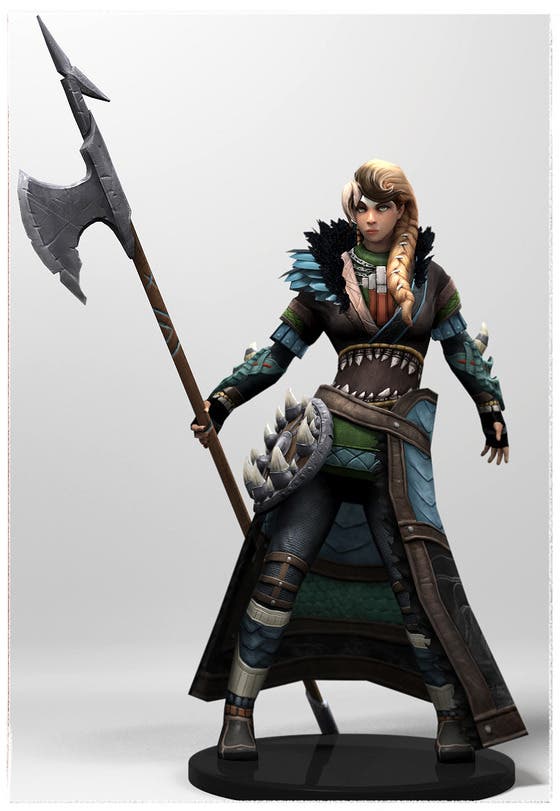
Disaster struck for Warhammer Online when Blizzard, already way out in front, upped the ante and released World of Warcraft's first expansion The Burning Crusade. That was in January 2007, and Warhammer Online was supposed to be out later that year. "When the first expansion pack came out we had a sit down with EA and said 'oh my god'," he remembers with a laugh. "'Oh man, were we not expecting this.' And nobody did - it caught everybody by surprise. Nobody thought they would spend as much money as they did on that expansion."
He heard rumours that The Burning Crusade cost "anything approaching and maybe even a bit beyond the true cost of making WOW", and even if it wasn't, even if it was $25 million or $50 million, "it was hugely expensive".
Jacobs had "a very serious talk with EA" and explained that he needed more time to include the sort of things Burning Crusade now dictated that MMOs needed to have. "We could have launched without some of that stuff, but I was like, 'You guys want this to be a big game, you've made it really clear that my initial sub numbers weren't good enough. You want more - OK, it's gonna cost ya.'"
EA gave the nod and in April 2007, Mark Jacobs announced that Warhammer Online had been delayed, as it would be again and again until it eventually came out in September 2008. The only problem with that date was that, a couple of months later, World of Warcraft's second expansion, Wrath of the Lich King, came out. Blizzard trickled out a bit of content early when Warhammer Online launched and then hit the world with Lich King in November. "EA wanted to launch when they wanted to launch," he shrugs. "It's their company and they have every right to do that. I could say I think we should wait, but it's their company."
What if Warhammer Online had launched a year later? There was no WOW expansion in 2009, and WAR would have benefited from another year in development ("what kind of a lunatic tries to get a three-year, high-end MMO out?"). Would WAR have faired any better?
As it was, Warhammer Online shot out of the traps with 750,000 registered accounts just under a month after launch, but months later when subscription fees were rolling in, the much truer count of paying customers was 300,000 - the number Jacobs had originally predicted. Today, Warhammer Online is a skeletal service - WOW shrugged Warhammer Online off like a cape.
It wasn't all down to WOW. WAR wasn't brilliant and Jacobs accepts that, not that there weren't flashes of brilliance in RVR (a part of the game later pulled out as the standalone free-to-play Wrath of Heroes). Eurogamer reviewed Warhammer Online at launch and then revisited it a year later.
Why EA didn't wait and see what happened with WAR before announcing Star Wars: The Old Republic (a month later) and embarking full throttle on it? Clearly Jacobs wasn't a believer, and in the summer of 2009, when EA merged Mythic and BioWare - or perhaps put BioWare in charge of Mythic - he walked away.
"My departure from EA was one both of us felt was in the best interests," he says. "They had a plan they wanted to execute in a certain manner with both BioWare and Mythic and with Star Wars. I was very vocal about what I thought about it and what I thought about SWTOR and other games."
"It would be really easy for me to sit and bash EA, believe me, very easy. I'm not going to do it. They made a call; none of us make the right calls every time. They thought they were doing the right thing, and it wasn't mean spirited. They believed that SWTOR needed Mythic to make the game happen. The doctors believed in their path for SWTOR, and I had my own opinions as well."
Camelot Unchained
Jacobs signed a non-compete agreement with EA when he left so he couldn't chase his RVR dream again even if he'd wanted to, and he didn't. He embarked on a venture in Singapore that fell through, and then he established City State Entertainment in 2011 with Warhammer Online programming whiz Andrew Meggs. The studio filled out with young talent and made iPad game March on Oz, which is a bit like Plants vs. Zombies. A few months down the road, though, Jacobs noticed that his young team were keen MMO players, and "it just started getting the juices flowing again". So he played some MMOs, particularly Guild Wars 2, and decided there and then that "I want to do another MMO", and his team were down with that. Investors weren't, mind you, but 2012 had been a great year for Kickstarter where Jacobs could test or prove a concept's appeal while raising money. And so it was that Camelot Unchained was born.
Putting an MMO together for $5 million will be tight, he knows, but he's got realistic expectations about what can be achieved, knows a thing or two about budgets and has a way of saving vast swathes of money. "If you look at an MMO and you look at where the [money] is spent ... it's all PVE right? Whether it's polys for the models, whether it's quests for PVE, whether it's programming for the AI, whether it's the effects for the NPCs, whether it's the land design, the world design for PVE - the vast majority of your resources go to PVE. That's just it.
"Look at Elder Scrolls Online: Matt's setting up a world where the majority of it is PVE, then Cyrodiil is the RVR area. You've got a tremendous spend on the outside, where the middle, essentially, is going to be the RVR endgame. Well, if you eliminate all of that stuff on the outside, how much do you think his budget would be?
"In my case I'm not even thinking about the outside. I'm just making one pure RVR world. I can eliminate so much of the content, so many of the designers I don't need, so many of the artists I don't need, and just focus on a limited subset of all that content.
"It is absolutely doable on $5 million."
Nor will Camelot Unchained try to win the proverbial beauty pageant, although "low budget doesn't mean craptastic". "Whatever you think is the prettiest game ever, just say I am not looking to out-pretty [it]." He's confident his team can make a striking game without going mad on polygons, and without all the monsters to design, the dungeons, the PVE stuff, his small team can lavish more attention on the dozen or so classes and races that will exist.
Bypassing visual flamboyance also means lots of PCs will play it and play it well - "we will make some sacrifices in order to keep that frame-rate high" - and that more time can be spent getting the gameplay right and tight. "After making these games forever, I am more and more convinced that what people want is great gameplay. The effects, the glowies, all that is nice, but [the players] will sacrifice them if at the end what they're having is a great experience in the game and a lot of fun." Worked pretty well for Minecraft after all.
An uncompromising ideal
Mark Jacobs has been there and done that in MMO land. He doesn't want to try and please everyone any more - he wants to be creatively fired up. "At this stage of my career I would rather make a game for a smaller, dedicated following than try to do another, over the top spend-a-gazillion-dollars-on-a-game theme park." There have been offers, apparently, and he's effusively turned them down. He knows Camelot Unchained is "not something that's going to have a quarter of a million subs" and he's never thought otherwise. "I don't think there's any way this game gets a quarter of a million subs in North America and Europe. But I don't need that. If we 50,000, we'd be fine. If we get 100,000, I'm happy."
His uncompromising RVR vision means scrapping friendly MMO features like enabling you to pop up after dying and get back to the battle quickly. "If you're trying to siege something and you're winning and you're doing great and you're knocking down the defence and going 'yeah we've got these guys', and somebody just goes 'ooga booga booga' and 100 other guys show up, you're like 'wow that was a waste of my time'. And I'm willing to say to players - which is once again why I'm going for a niche game - sorry, that's a modern MMO convenience that does not fit in this kind of game."
"It is absolutely doable on $5 million."
Because there's no major PVE content [there will be some PVE related to resources for crafting and maybe that big underground dungeon where you become the monsters when you die -Ed] there's no need for classes to have abilities and skills relating to it. Everything is designed for players fighting players. "I can look at a tank and go, forget all this PVE stuff, how can we make this guy really, really useful in combat only against other players - and, even better, very strong against a certain type of foe?"
With wizards or mages he wants to "put the magic back in magic" and make them more than "archers with magic" who stand back and do damage at range. That means a spread of "non-traditional" spells that have varying effects on players like, of course, the sleep spell known as mesmerise, which - "if you're really smart" - can enable a well organised team to defeat an entire army. Being crowd-controlled "until your next birthday" is not something Jacobs wants, though.
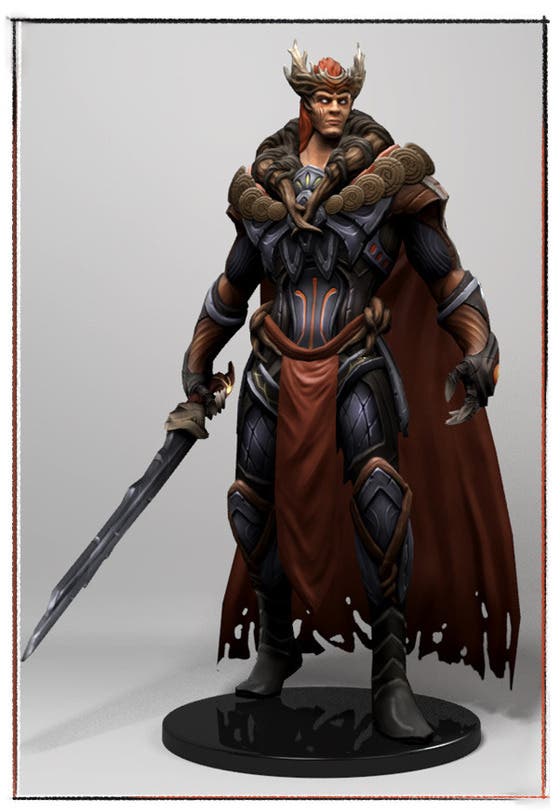
Archers need a "rethink" because they've become too much like "mages with bows". "Why aren't we saying that look, if you have a field of archers and they can unleash a torrent of arrows, they're not going to hit everything, but when they hit they're going to be very dangerous? And why can't we have people putting up their shield to try and deflect these arrows instead of simply going yeah, they're instant hit? And why don't we have aiming, even if it's not true aiming, but a system that is a little bit more exciting and interesting?" He likes the idea of camouflage for archers rather than invisibility, too.
Redesigning rogues or assassins means redesigning the "broken" stealth game of creeping up to someone unseen, hitting them with a stun attack and then finishing them off before they can do anything about it - and then turning invisible again. His idea? "It is something I haven't seen certainly in any other MMO. It is bat-s*** crazy, if it works. I don't even know if it's a great idea. It's a unique idea, it's an idea that is strategically and tactically unique that opens up so many interesting avenues of gameplay, but I don't know if it's going to work." There will be a video released later today about one possible implementation of stealth in the game.
Camelot Unchained will also have a new kind of MMO class dedicated to crafting, both on the front lines fortifying defences and erecting siege equipment, as well as behind them making swords and armour. All classes will have a base ability to build houses, but the dedicated crafter is the most talented. And as all equipment comes from players in Camelot Unchained - again, there are no monsters to loot - their role in the world will be pivotal. And it's a role Jacobs thinks is perfect for wives or girlfriends or boyfriends or children or parents - significant others - who don't necessarily want to fight but want to help. "A lot of people would play these games if they could do nothing but craft," he believes.
Healers will play their crucial role in the holy trinity of class design the game uses, but they won't be buff bots who bestow everlasting enhancements - statistical advantages - and then sit idly in the safety of keeps.
There will be levelling but "it's going to be slow versus fast progression", and "it's going to be horizontal not vertical". Levelling sped up to such a degree with each subsequent MMO that Jacobs now believes levels whiz past so quickly that players barely notice them. "It's not about how quickly you can get to level-cap because this is an RVR game. In a PVE game, a lot of the reason you want to get to level-cap is so you can get out and do RVR as a really powerful character. That's not how it's going to work.
"We want people in RVR right from the beginning - it's the only way you can play the game. If we go with a more horizontal approach - more abilities but they don't scale in that same manner - it means you as a lower-level player can get into the mix."
Opting for horizontal progression - breadth of abilities rather than simply more powerful ones - means encountering a higher level player on the battlefield won't mean an insurmountable power imbalance and relatively instant death. "I want people to enjoy the game. I want to take the focus away from the 'ding gratz' and put it more on playing. We've got to be better, I mean, come on, it's 2013, we've been making MMOs now for 20 years almost, and we need to find some better ways to do this."
Mark Jacobs has expanded on his game philosophies extensively on the Camelot Unchained website and in Kickstarter updates. There has even been a huge dungeon unveiled where all three realms will clash and, when they die, become the monsters down there. Andrew Meggs has detailed the technology in more detail on Kickstarter as well.
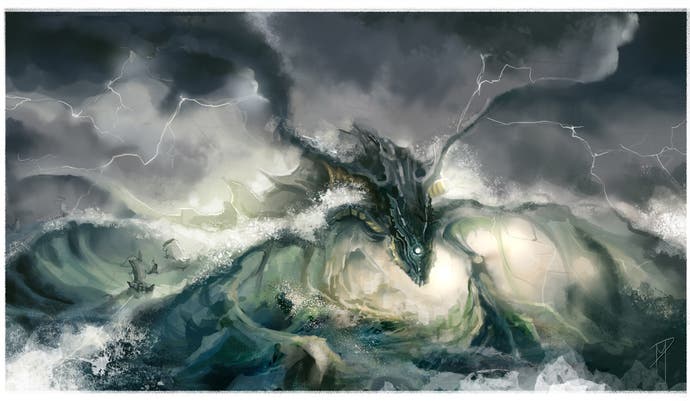
What if Kickstarter doesn't work out?
Camelot Unchained isn't home and dry yet, and there's still just as much chance it could fail. If that happens and the game is well short of its goal then "unfortunately we can't [carry on]". "But if there's enough support to assure me and the other investors that there's a strong enough core that really want this game, then it would be stupid not to try again."
There's still a game to be built, though, still ideas to be turned into tangible, workable, mechanics. This is just the beginning and MMOs are scary projects, as Mark Jacobs can well attest. He's been here before, though - he's led ballsy projects and he's made them work. And this time he's creatively unshackled - unchained, if you like - and making the kind of MMO I dreamed about while waiting on a portal to Emain Macha or Odin's Gate all those years ago. He's got big ideas to realise, but what ideas they could turn out to be. Perhaps we shouldn't be looking at The Elder Scrolls Online or even Blizzard's Project Titan to lead us into a new generation of MMOs. If Kickstarter does work out for Camelot Unchained, perhaps it's to these smaller, independent and creatively risky MMOs we should turn. We have with so many other genres, after all.
